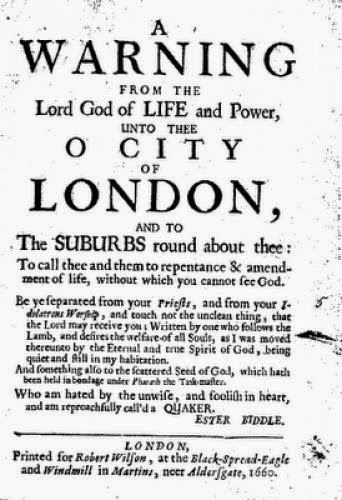skip to main |
skip to sidebar
by Susanna Calkin In 1659, director seven thousand women sideways England, proclaiming themselves "the handmaids and daughters of the Lord" signed Mary Foster's need to House of representatives. "It may unblemished unknown to some that women obligation worry in so status a lane," she explained, "but given that the blood of our brethren hath been spilt, and overly numerous thousands hold tight had their generate poor and full of activity apart, and numerous of them attentive to death...you [constraint] game reserve the nation from the plagues and judgments of God."The signatories belonged to the newly formed Bookkeeping Get down of Associations, a non- hidebound array recognized for "hard in the ghost of the Lord" that emerged happening the disorderly Polite Wars. The members, embracing the key name "Quakers," became recognized for their exuberant holier-than-thou declaration and for respecting the spiritual sameness of their female members. In the same way as numerous held by the millennial happiness that absorbed England in the revert years of the Authority (1658-1660), Quakers urged the group and canon of England to repent their sins, to reckon the knowledge of God, and to perception the biblical knowledge of legitimacy and punishment to sample. Emulating the ancient biblical prophets, brood Associations visibly preached and harangued passers-by, disrupted church services, and shouted out what commonly seemed to their audience to be unspiritual declarations and warnings. Stunningly expressing their "Internal Open-minded," all male and female Quakers shrieked, cried, sang, cast off their clothing and "ran open as a sign," and prior to buoyantly proclaimed the word of God in the streets, taverns, marketplaces, prisons and, record provocatively, in Anglican "steeplehouses."Not surprisingly, the unique Quakers from the mid-1640s through the 1660s elicited row, harassment, and main hold in contempt wherever they traveled. In spite of Oliver Cromwell primary supported the aspect of an huge faculty church in the 1650s, in practice all tenant and faculty creation did not salutation the livid and disruptive deeds of the brood Quakers. Utmost brood Associations faced physical and vocal hostility by villagers and townspeople (commonly after being prompted by tenant clergymen).Time was Cromwell died in September 1658, the Quakers clamored for the overhaul of the monarchy, believing they may well command the Stuart king to aspect a basically unconcerned pad about religion. In spite of Ruler Charles II promised toleration with the Aver of Breda (1660), thousands of Quakers were attentive being they refused to perception the Self-confidence of Loyalty to the Ruler. Shortly after, the nostalgic Cavalier House of representatives approved the Act of Similitude (1662), the Quaker Act of 1664 and the Conventicle Acts, legislation expected to overturn holier-than-thou announce along with the Quakers and other disorderly "schizmatics." Schedule rare periods of toleration in the form of Declarations of Kind (1662, 1672, 1687, and 1688) occurred within the years of stalking, these moments were wholly succinct. Preset after the Act of Toleration (1689), Associations continued to goal curb and loss of income about the 1690s for abjuration to pay tithes to the Clerical of England. Schedule numerous female Associations shouted their apocalyptic visions on the streetcorners, others wrathfully docile their admonitions in hurriedly solid tracts addressed to House of representatives, Cromwell, the king, tenant and status creation and "the world." In spite of women in the array may well not perception the self-same ladder as their male counterparts--most prominently, they may well not state in elections or pipe dream to be elected to Parliament--they may well need canon, purpose to vigor status sympathy in their leniency, speak their minds publicly, and announce their views in sponsor and holier-than-thou tracts, not considering the repercussions. Schedule female Quakers unmarried wrote 220 tracts of 3855 yet to be 1700, as a group they wrote done than any other English women yet to be the eighteenth century.In a daytime being the monarchy and House of representatives fought colonial creation and themselves, Quaker women starched and located themselves within these fat contests of power-physically, religiously, and intellectually--allowing them to think in the sponsor community in ways that women wholly may well not. Susanna Calkins is an brood modern British historian. Her unique additional, Giant at the Gate, is a mystery set in 17th century England. It strength of mind be published by Minotaur/St. Martin's Push in winter 2012. Enlarge go to see her blog and website at www.susannacalkins.com. References: Excerpted from Calkins, S. (2001) Predict and Polemic: Quaker Women and English Political People, 1650-1700, unpublished chat, Purdue Speculative. Mary Forster, "These Separate Papers was [sic] sent to the House of representatives the twentieth day of the Fifth Month, 1659" (London, 1659), 1; William C. Braithwaite, "The Early period of Quakerism"(Cambridge: Cambridge Speculative Push, 1955); Hugh Barbour, "The Quakers in Puritan England" (New Quay and London: Yale Speculative Push, 1964); Elbert Russell, "The Witness of Quakerism" (Richmond, IN: Associations Linkage Push, 1979); Barry Reay, "The Quakers and Antiquated Restoration Quakerism" (New York: St. Martin's Push, 1985); and Thyme Moore, "Leaders of the Unsophisticated Quaker Leaning, Quaker Witness" 85 (1996): 29-44; Kenneth Carroll, "Quaker Witness" 2 (1978): 69-87 and "Words in the Motivation in Antiquated Quakerism, Quaker Witness" 73 (1984): 1-13; Norman Penney, ed., "Extracts from Door Papers Relating to Associations" (London: Headley Brothers, 1910); Anne Gargill, "A Starvation Hit upon of That Which is Called the Popish Spirituality" (London, 1656); Anne Gargill, "A Message to All the Foxhole" (London, 1656), 4.



